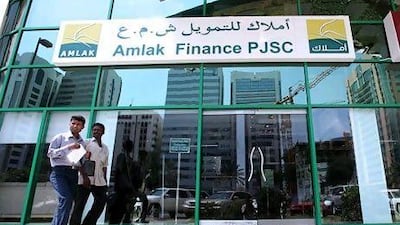Amlak, the Islamic home loan company which stopped issuing new credits in 2008, posted a larger net loss as income from its core business fell and impairments more than doubled.
Amlak Finance, which is in limbo due to a three-year long restructuring by the Government, made a net loss of Dh52.2 million (US$14.2m) for the second quarter, compared with a loss of Dh597,000 in the same period last year.
Amlak and its rival Tamweel were the two largest Islamic home loan companies during Dubai's six-year building spree.
But the decline in property prices in the autumn of 2008 exposed weaknesses in their funding models, which relied on raising short-term debt to finance the long-term mortgage commitments of their customers.
Trading of Amlak and Tamweel was suspended in November 2008 after both companies lost access to sources of wholesale funding.
A plan to merge the companies was floated by the Government, but abandoned after Dubai Islamic Bank raised its stake in Tamweel to 57.3 per cent, effectively rendering the lender a subsidiary.
Unlike Amlak, which is still unable to write new business, Tamweel has resumed lending and last month reported a fivefold increase in profits.
Tamweel declared net income of Dh27.7m for the second quarter, its best quarterly result since the decline of the Dubai property market in the wake of the global financial downturn.
Amlak's revenue declined 12 per cent to about Dh148m "as a result of no new business origination over the past two years continuing into 2011 and further mortgage rate cuts offered to existing customers", according to the company. Impairments on Islamic financing and investing assets jumped to Dh61.2m from Dh29.7m.
A government committee studying an overhaul of Amlak "continues to explore the possibilities of a balance-sheet restructuring", the company said in May.
Jaap Meijer, a senior analyst at AlembicHC in Dubai, said Amlak needed significant impairments on its property investment portfolio. "Amlak may also need a capital increase, depending on the size of the necessary impairments and [it] also needs to secure longer-term funding."
Tamweel was in a far better position because it had a much smaller investment property book and it had already taken large impairments and secured long-term funding. "We expect Tamweel to gain market share in new mortgage origination," he said.
After balance-sheet restructuring, Amlak should focus on mortgage origination, as Tamweel had done, said Mr Meijer.
* with Bloomberg and Reuters
gduncan@thenational.ae
The candidates
Dr Ayham Ammora, scientist and business executive
Ali Azeem, business leader
Tony Booth, professor of education
Lord Browne, former BP chief executive
Dr Mohamed El-Erian, economist
Professor Wyn Evans, astrophysicist
Dr Mark Mann, scientist
Gina MIller, anti-Brexit campaigner
Lord Smith, former Cabinet minister
Sandi Toksvig, broadcaster
More from Rashmee Roshan Lall
Electoral College Victory
Trump has so far secured 295 Electoral College votes, according to the Associated Press, exceeding the 270 needed to win. Only Nevada and Arizona remain to be called, and both swing states are leaning Republican. Trump swept all five remaining swing states, North Carolina, Georgia, Pennsylvania, Michigan and Wisconsin, sealing his path to victory and giving him a strong mandate.
Popular Vote Tally
The count is ongoing, but Trump currently leads with nearly 51 per cent of the popular vote to Harris’s 47.6 per cent. Trump has over 72.2 million votes, while Harris trails with approximately 67.4 million.
How to get exposure to gold
Although you can buy gold easily on the Dubai markets, the problem with buying physical bars, coins or jewellery is that you then have storage, security and insurance issues.
A far easier option is to invest in a low-cost exchange traded fund (ETF) that invests in the precious metal instead, for example, ETFS Physical Gold (PHAU) and iShares Physical Gold (SGLN) both track physical gold. The VanEck Vectors Gold Miners ETF invests directly in mining companies.
Alternatively, BlackRock Gold & General seeks to achieve long-term capital growth primarily through an actively managed portfolio of gold mining, commodity and precious-metal related shares. Its largest portfolio holdings include gold miners Newcrest Mining, Barrick Gold Corp, Agnico Eagle Mines and the NewMont Goldcorp.
Brave investors could take on the added risk of buying individual gold mining stocks, many of which have performed wonderfully well lately.
London-listed Centamin is up more than 70 per cent in just three months, although in a sign of its volatility, it is down 5 per cent on two years ago. Trans-Siberian Gold, listed on London's alternative investment market (AIM) for small stocks, has seen its share price almost quadruple from 34p to 124p over the same period, but do not assume this kind of runaway growth can continue for long
However, buying individual equities like these is highly risky, as their share prices can crash just as quickly, which isn't what what you want from a supposedly safe haven.


